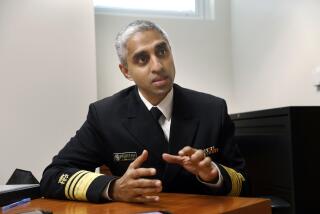Seeing Sex Education as a Sacred Duty
- Share via
Surgeon General David Satcher’s recent report on sex is a straightforward, clear and compelling call for a “mature ... dialogue on issues of sexuality, sexual health and responsible sexual behavior.” It’s really too bad that the Bush White House isn’t grown up enough to join in the conversation.
A close reading of the report brings into focus a crisis so pervasive that embarrassment, ignorance and politics should wither in the face of the need for direct action. We know who is sick, we know why they are sick, we know what would make them healthier, but we dare not talk about these things.
Satcher issued his findings without blinking and without apology:
*That sexually transmitted diseases, or STDs, accounted for 87% of the 10 most commonly reported infectious diseases in the United States.
*That nearly half of all pregnancies are unintended and that women in all age, income, race and ethnicity categories experience unintended pregnancies.
*That the contention that adolescents obtain the majority of abortions is inaccurate.
*That families differ in their level of knowledge and emotional capability to discuss sexual issues.
*That “simply being affiliated with a religion does not appear to have great effect on sexual behavior” but that, under certain circumstances, religious attendance leads to increased use of contraceptives by boys.
*That the evidence suggests that school attendance reduces adolescent sexual risk-taking behavior and, conversely, that kids who drop out of school are “more likely to initiate sexual activity earlier, fail to use contraception, become pregnant and give birth.”
Wow, could it really be that simple? Do all we can to keep kids in school? Educate them with the values of abstinence and equip them with the negotiation skills (and the medical resources) that lead to greater condom and contraceptive use?
Satcher believes that this process of lifelong learning about sexual matters should start early, continue through the years and not leave out the icky parts. Or, in his more scientific language, we should be providing “access to education about sexual health and responsible sexual behavior that is thorough [and] ... wide-ranging.”
At several points the report notes the inordinate impact that teen pregnancy, STDs, HIV/AIDS and the attending economic consequences have had on black and Latino populations.
Coincidentally, on July 11, the fifth annual National Black Religious Summit on Sexuality opens at Howard University Divinity School in Washington, D.C. The summit, sponsored by the Religious Coalition for Reproductive Choice, is based on the belief that religious organizations have a role to play in communicating important information about responsible sexual behavior.
After attending the first such summit in 1997, I returned to my church and surveyed our youth department to consider starting a sex education program.
Our children were generally under 10 with only one teenager, a 15-year-old girl. I decided to wait until the average age of the group was older. Unfortunately, that year our teen pregnancy rate was 100%--our one teenage girl got pregnant.
That experience demonstrated to me that churches, especially black churches, must break the silence regarding sexual issues. Preaching is only one part of what we in the faith business must do. We must offer our youth a frank, honest, thorough sex education curriculum, one that is in keeping with the values of each of our faith communities.
Two other critical elements that are noted by the report can help young people make better choices about their sexual behavior: enhanced self-esteem and an increased belief in the future.
For the black community, I can think of no institution better able to provide these things than the church.
I hope that the black church will embrace the surgeon general’s report and not reject it, as some evangelical Christian and so-called pro-family organizations have done.






